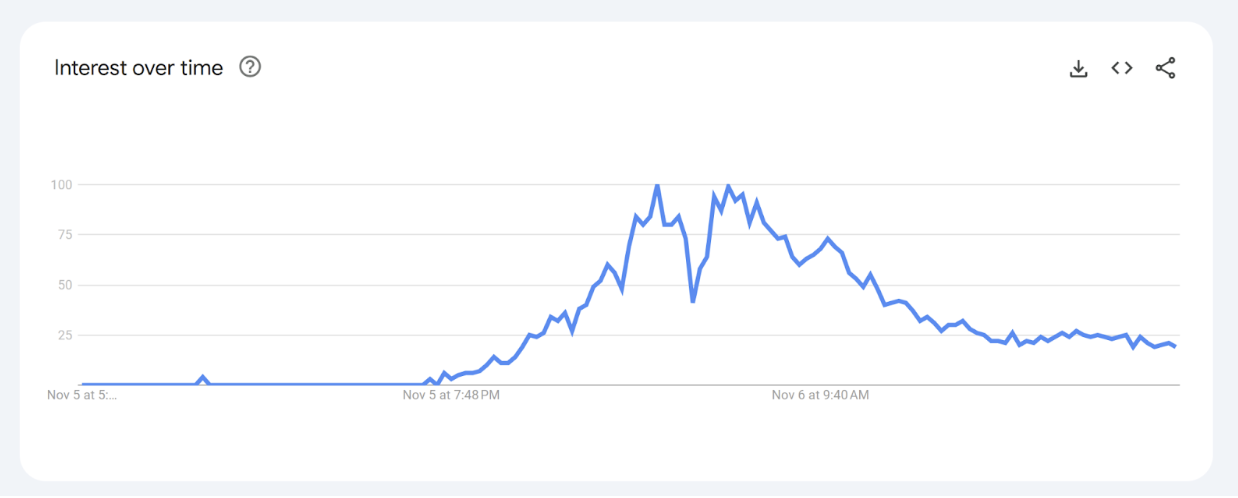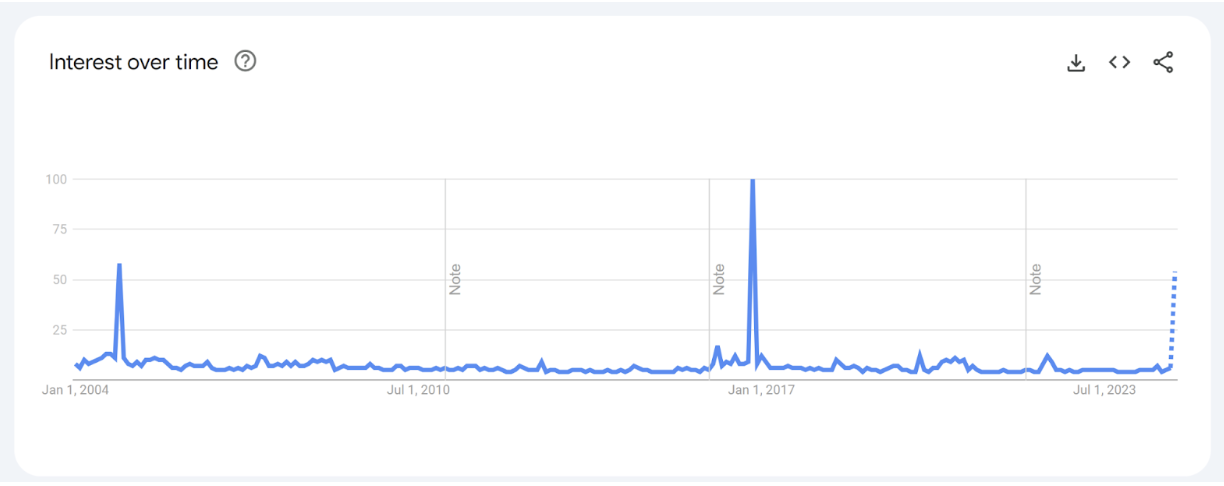WASHINGTON — Unhappy with the current state of American politics? Have you considered moving to Canada?
You’re not alone — there’s been pervasive online discourse around fleeing to Canada among Americans despairing over a second Trump presidential term.
The non-existent recent history of a mass Canadian exodus
“good morning i’m making plans to move to canada,” one X user wrote at 8:21 a.m. Wednesday morning, around three hours after the Associated Press declared Trump the new president-elect at 5:34 a.m.
Indeed, online searches for “moving to Canada” spiked in the evening hours of Nov. 5 and into the morning of Nov. 6, peaking at 3:32 a.m. and 6:19 a.m. Wednesday morning, according to Google Trends data. These search spikes came shortly after AP called Pennsylvania and then Wisconsin for Trump. However, the popularity of the search term fell through Wednesday afternoon and evening.

Google Trends data over the time range of Nov. 5 at 6 a.m. to Nov. 6 at 11 p.m. shows that the popularity of “moving to Canada” as a search term peaked at 3:32 a.m. and 6:19 a.m. on Nov. 6.
Vermont, Maine, Oregon and New Hampshire were the top four states where the search term skyrocketed in popularity, and other top related searches included “moving to ireland” and “new zealand.”
The all-time popularity for “moving to Canada” peaked in November 2016, shortly after Trump won the election for his first presidential term. A crash of Canada’s official government immigration website due to high visitor traffic ensued, a problem that did not occur Wednesday morning. This year, the term was searched only around half as much at its peak relative to November 2016’s popularity.
The data also shows a spike in the search term in November 2004, when Republican president incumbent George W. Bush was elected to a second term. Bush is the last Republican president before Trump. In comparison to this year’s search spike, November 2004’s spike was considerably more popular, with a five percentage point difference in relative search interest.
“Moving to Canada” did not spike in popularity in Nov. 2008 and Nov. 2020 — when Democratic presidents Obama and Biden were elected into office — to the same magnitude as when Republican candidates won their elections.

Google Trends data over the time period of “2004 – present” show three major spikes for “moving to Canada” as a search term: One in Nov. 2004, another in Nov. 2016, and the most recent one in Nov. 2024.
Statistics from Immigration, Refugees and Citizenship Canada, recovered by CTV News, show that there was an uptick of Americans applying to permanent residency in Canada during Trump’s first year as president, from 7715 applications in 2016 to 9018 applications in 2017. The number of applications hovered around 9000 for the years of 2018 and 2019.
Despite the spike, the number of applications is minimal compared to Americans currently registered as Democrats and Independents, a trend that will likely persist. At the time this article was written, over 68 million Americans voted for Kamala Harris in the 2024 presidential election.
However, one deterrent to those hoping to settle North may be the fact that Canada reduced permanent resident targets in 2025 from 500,000 to 395,000 in October.
The Liberal Party currently rules and forms the Canadian government, with the Prime Minister of Canada Justin Trudeau as its leader. But recent polls show that nearly two-thirds of Canadians disapprove of Trudeau’s prime ministership and that Canada’s Conservative Party could win nearly four times as many seats as Liberals in the upcoming 2025 Canadian elections.
Thus, Canada will likely remain an unlikely choice for those seeking an escape from American politics.
O Canada
Medill News Service talked to multiple Harris supporters at Howard University Wednesday night on their opinions about a potential leftist exodus to Canada.
Jeanne Richardson, 54, said that despite being “disappointed” with the new president-elect, she wouldn’t consider leaving America for Canada.
“I don’t think it’s going to help because American politics affects the world,” Richardson said.
Jose Jaquez, 20, agreed with this sentiment. He believes leaving the country is not the solution to fix electoral politics.
“If we see more people move to Canada who tend to be Democrats, then that means they’re going to have a lot less Democrats here, and so it’s going to be a lot harder to make progress in this country,” Jaquez said. “So I hope they stay.”
Kailey Breland, 18, said she had “looked into [Canadian] citizenship.”
“I’m scared for the future of America,” Breland said. “I might have to go to Toronto.”
Outside of Canada, Breland said she’s thought about moving to the Netherlands, Korea, Japan, Singapore and countries in Africa.
“Some countries just have a lot more rights than we do,” she said.
Morgan Walker, 18, said she would consider moving to Canada, but also was interested in moving to London to escape American politics.
“Anything is better than Trump,” Walker said.

